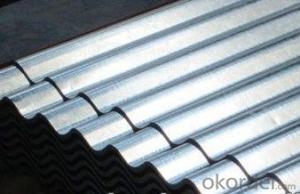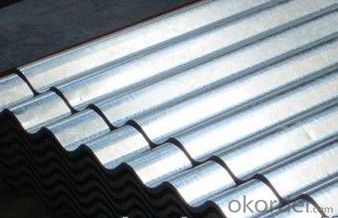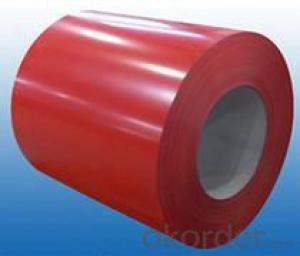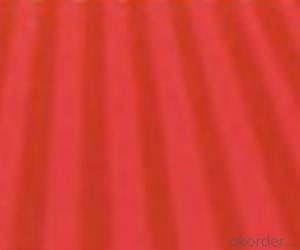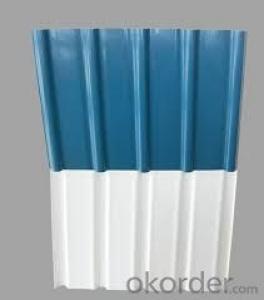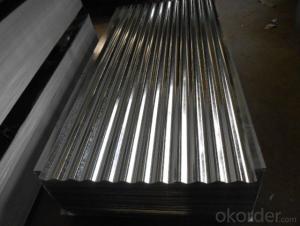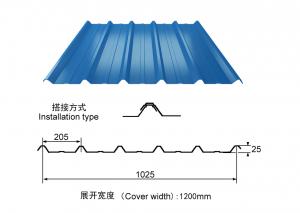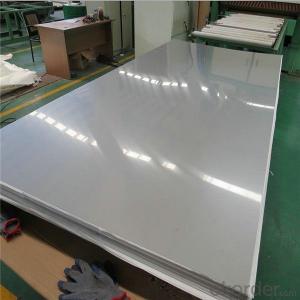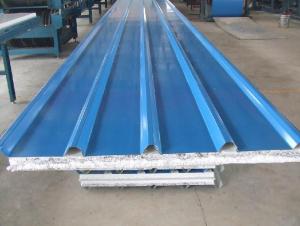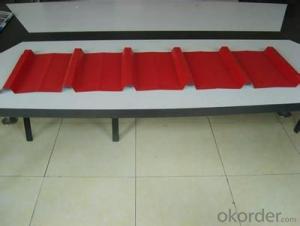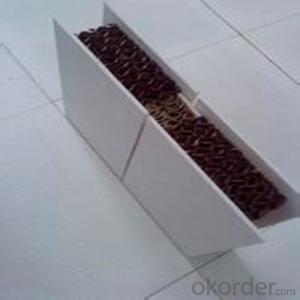S280GD Corrugated Steel Sheet
- Loading Port:
- China Main Port
- Payment Terms:
- TT OR LC
- Min Order Qty:
- -
- Supply Capability:
- -
OKorder Service Pledge
Quality Product, Order Online Tracking, Timely Delivery
OKorder Financial Service
Credit Rating, Credit Services, Credit Purchasing
You Might Also Like
Quick Details
Standard:ASTM, DIN, GB, JIS
Grade:SGCC / DX51D+Z /
Thickness:0.15mm-1.2mm
Place of Origin:Tianjin, China (Mainland)
Model Number:S280GD
Type:Steel Plate
Technique:Hot Rolled
Surface Treatment:Coated
Application:Widely used in construction industry
Special Use:Silicon Steel
Width:790mm-1025mm
Length:as per your request or a fixed length
Note:We support for the third party inspection
- Q: Are lead contained in galvanized steel plates and plain steel plates?
- Steel plate is made of molten steel, cooled and compressed into flat steel.
- Q: What is the typical elongation of a steel sheet?
- The typical elongation of a steel sheet can vary depending on the specific grade and thickness of the sheet. However, as a general guideline, the typical elongation for a steel sheet can range from 20% to 40% before it reaches its breaking point.
- Q: What are the different fastening options for steel sheets?
- There are several fastening options available for steel sheets, depending on the specific application and requirements. Some common fastening options for steel sheets include: 1. Screws: Steel sheets can be fastened using screws, which are readily available and easy to use. Self-tapping screws are commonly used for fastening steel sheets, as they can create their own threads in the material. 2. Bolts and nuts: Bolts and nuts provide a strong and secure fastening option for steel sheets. They are commonly used in applications where the fastening needs to be adjustable or removable. 3. Rivets: Rivets are permanent fasteners that are commonly used to join two or more steel sheets together. They are often used in applications where a watertight or airtight seal is required. 4. Welding: Welding is a commonly used method for fastening steel sheets. It involves melting the edges of the sheets and fusing them together. Welding provides a strong and durable connection but requires specialized equipment and expertise. 5. Adhesives: Certain adhesives, such as epoxy or structural adhesives, can be used to bond steel sheets together. Adhesives can provide a clean and aesthetically pleasing connection, but their strength may vary depending on the specific adhesive used. 6. Clips and clamps: Clips and clamps are often used to secure steel sheets in place. They can be easily installed and removed, making them a popular choice for temporary or adjustable fastening needs. 7. Magnetic fasteners: Magnetic fasteners, such as magnetic strips or magnets with hooks, can be used to attach steel sheets to magnetic surfaces. This provides a convenient and easy-to-use fastening option. It is important to consider factors such as strength, durability, ease of installation, and removal when selecting a fastening option for steel sheets. The specific requirements of the application, such as load-bearing capacity and environmental conditions, should also be taken into account to ensure the chosen fastening option is suitable for the intended purpose.
- Q: What are the different types of steel sheet finishes for decorative purposes?
- For decorative purposes, one can find several varieties of steel sheet finishes that are commonly utilized. These finishes are applied to the steel sheet's surface with the intention of enhancing its appearance and achieving a desired aesthetic effect. Some of the most favored finishes for decorative purposes are as follows: 1. Brushed Finish: Achieved by brushing the steel sheet's surface with a fine abrasive material, usually in a straight line pattern, this finish imparts a smooth and satin-like appearance. It is widely used in architectural and interior design applications. 2. Mirror Finish: Also known as a polished finish, this type creates a highly reflective surface that resembles a mirror. The steel sheet is mechanically polished to achieve this finish, and it is commonly seen in decorative applications such as furniture, lighting fixtures, and signage. 3. Patterned Finish: This finish involves embossing or etching a pattern onto the steel sheet's surface. It can be achieved through various techniques like stamping, laser engraving, or chemical etching. Patterned finishes provide a decorative and textured appearance and are often used in applications like elevator panels, wall cladding, and decorative screens. 4. Colored Finish: To add vibrancy and enhance visual appeal, steel sheets can be coated with a colored finish. Processes such as powder coating are employed, where a dry powder is applied to the steel sheet and then cured to create a durable, colored finish. Colored finishes are commonly used in architectural applications like building facades and signage. 5. Antique Finish: This particular finish is designed to give the steel sheet an aged or weathered look, resembling antique metal. Various techniques such as chemical treatments, patinas, or distressing can be employed to achieve this appearance. Antique finishes are often utilized in decorative applications to create a rustic or vintage aesthetic. These are just a few examples of the diverse range of steel sheet finishes available for decorative purposes. Each finish provides a distinct appearance and can be customized to suit specific design preferences. The choice of finish relies on factors such as the desired look, application, and required level of durability for the project.
- Q: Are steel sheets resistant to bending or deformation?
- Yes, steel sheets are generally resistant to bending or deformation due to their high tensile strength and rigidity.
- Q: Why should the back of the steel sheet pile cofferdam be pumped after the construction of the pile cap?
- The appearance of surface defects of steel sheet pile, length, width, thickness, end rectangle ratio, flatness and lock shape content of inspection, do not meet the requirements of steel sheet pile is corrected, in order to reduce the difficulties in piling process.
- Q: Are steel sheets suitable for manufacturing kitchen appliances?
- Yes, steel sheets are suitable for manufacturing kitchen appliances. Steel is a versatile and durable material that is commonly used in the manufacturing industry. It has high strength, which makes it suitable for withstanding the daily wear and tear of kitchen appliances. Steel sheets are also resistant to corrosion, which is important in a kitchen environment where appliances are constantly exposed to water, moisture, and food spills. Additionally, steel is a hygienic material that is easy to clean and maintain, making it ideal for kitchen appliances where cleanliness is crucial. Furthermore, steel sheets can be easily shaped and formed into different designs and sizes, allowing for a wide variety of kitchen appliances to be manufactured. Overall, steel sheets provide the necessary properties and characteristics required for the manufacturing of kitchen appliances.
- Q: Can the steel sheets be used for kitchen countertops?
- Yes, steel sheets can be used for kitchen countertops.
- Q: Can steel sheets withstand extreme weather conditions?
- Yes, steel sheets are designed to withstand extreme weather conditions. Steel is known for its strength and durability, making it an ideal material for withstanding harsh weather elements such as high winds, heavy rain, snow, and extreme temperatures. Steel sheets are often used in construction, roofing, and outdoor applications where they are exposed to various weather conditions. Additionally, steel sheets can be coated with protective layers such as galvanized or painted finishes, which further enhance their resistance to corrosion and weathering. Overall, steel sheets are highly reliable and can endure extreme weather conditions with minimal damage or deterioration.
- Q: Are steel sheets suitable for oil rig platforms?
- Yes, steel sheets are suitable for oil rig platforms. Steel is commonly used in the construction of oil rig platforms due to its strength, durability, and ability to withstand harsh offshore conditions. It provides the necessary structural integrity and resistance to corrosion, making it a reliable choice for such applications.
Send your message to us
S280GD Corrugated Steel Sheet
- Loading Port:
- China Main Port
- Payment Terms:
- TT OR LC
- Min Order Qty:
- -
- Supply Capability:
- -
OKorder Service Pledge
Quality Product, Order Online Tracking, Timely Delivery
OKorder Financial Service
Credit Rating, Credit Services, Credit Purchasing
Similar products
Hot products
Hot Searches
Related keywords
